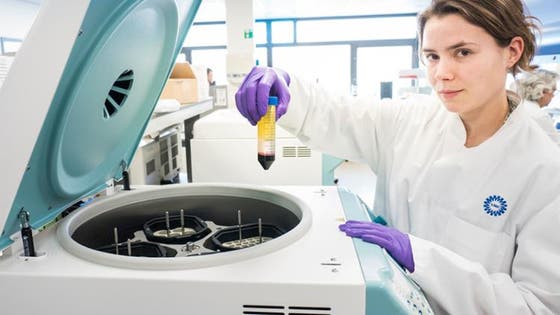Oct 27: Tackling the Achilles heel of spondyloarthritis

The root cause of spondyloarthritis – an inflammatory joint disease - may be found in the acquired immune system. However, the precise mechanism of action needs further research, concludes Tessa van Kempen in her PhD thesis.
Spondyloarthritis (SpA) is a chronic inflammatory disease that is associated with joint and extra-articular complaints. SpA is a collective name for several rheumatic diseases, including ankylosing spondylitis and psoriatic arthritis. However, it is not known whether SpA is an auto-inflammatory or autoimmune disease. Auto-inflammation is caused by uncontrolled production of pro-inflammatory substances, including cytokines, whereas autoimmune disease is driven by the acquired immune system including T and B cells. The objective of this thesis was to unravel pathogenic mechanisms in SpA, with focus on antigen-induced inflammation.
Findings in ankylosing spondylitis
In this thesis Tessa van Kempen (Center for Translational Immunology, UMC Utrecht) and colleagues investigated whether SpA may be an autoimmune disease. In one of the studies, they observed that an enzyme called ‘signal peptide peptidase-like 2A’ (SPPL2a) more often functions sub-optimally in monocytes from patients with ankylosing spondylitis. The substrate for SPPL2a includes CD74. A defect in SPPL2a leads to an accumulation of CD74 fragments that can be transported to the cell surface. These fragments are recognized by anti-CD74 antibodies, which can be found in sera from patients with ankylosing spondylitis.
Findings in psoriatic arthritis
The investigators also set up an in vitro model to find antigen-reactive CD8+ T cells in psoriatic arthritis. They reported on CD8+ T cell receptors that can be found in several patients with psoriatic arthritis and also in psoriatic skin. Finally, Kempen also showed that innate lymphoid cells type 3 are present in synovial fluid of patients with psoriatic arthritis.
According to Tessa van Kempen, the studies described in her thesis demonstrate that the acquired immune system is involved in SpA disease. Follow-up research will focus on how the acquired immune system relates to the development of SpA, and should ultimately result in better treatment modalities.
Spondyloarthritis
Spondyloarthritis, affecting 1-2 percent of the population, is a type of arthritis that attacks the spine and, in some people, the joints of the arms and legs. Extra-articular symptoms may include psoriasis, uveitis and inflammatory bowel disease. People in their teens and 20s, particularly males, are affected most often and a familial, preponderance has been observed. NSAIDs offer symptom relief for most patients by reducing pain and swelling. Biologicals (TNF blockers, IL-17 blockers) may be effective in patients who do not respond to NSAIDs.
PhD defense
Tessa van Kempen (1987, Eindhoven) defended her PhD thesis on October 27, 2020 at Utrecht University. The title of her thesis was “Tackling the Achilles heel of spondyloarthritis – Is it an autoinflammatory or autoimmune disease?”. Supervisor was prof. dr. Timothy Radstake and co-supervisor was dr. Marianne Boes (both Center for Translational Immunology, UMC Utrecht). Tessa van Kempen works as a lecturer for the Bachelor of Nursing program at the Fontys University of Applied Sciences in Eindhoven (the Netherlands).
